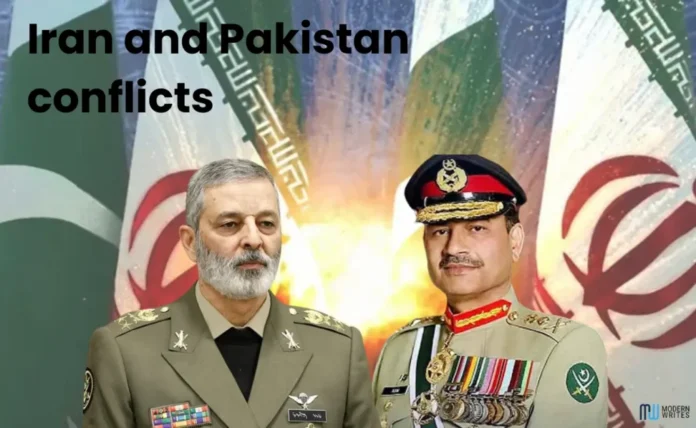Government, religious, and political elements have interacted in a complicated way to shape the Pakistan and Iran conflicts. There have been times in the past when the two nations have experienced severe conflict. This article will outline the key issues that have fueled the challenge between Pakistan and Iran.
Historical Background Iran and Pakistan Conflicts
Pakistan and Iran share a long and fragile border, which has been a source of both harmony and conflict. Both countries boast a rich history, yet the 1947 division of India into India and Pakistan, followed by the establishment of Iran as an independent state, shaped their distinct paths.
Iran, which is home to the Shia bulk, and Pakistan, which is home to the Sunni majority, have inherited a religious split that has played a crucial role in shaping the Pakistan and Iran conflicts between the two nations.
Strategic interests
Iran and Pakistan occupy a significant position in the areas they govern from a strategic standpoint. Pakistan holds an important stake in South Asian geopolitics due to its nuclear capabilities and enviable position, while Iran is a big oil producer and a major regional force with an impact in the Middle East.
In order to protect their national interests, which frequently overlap and occasionally clash, both nations have attempted to make the most of their strategic assets.
Economic Cooperation
Despite the Pakistan and Iran conflicts and regional challenges, over the years, Pakistan and Iran have significantly growing their financial association. Initiatives like the gas pipeline connecting Iran and Pakistan, which aims to supply Pakistan’s energy needs, have displayed the possibility of jointly useful cooperation.
However, government conflicts and international sanctions against Iran have frequently impeded the advancement of such projects, reducing the amount of financial interaction between the two nations.
Government Competitions
Complex alliances and competitions characterize the government environment of South Asia and the Middle East, where outside countries frequently attempt to shape the course of regional dynamics. Pakistan’s global stance has been shaped by its partnership with the United States and its strong friendship with Saudi Arabia, sometimes at the expense of its connections with Iran.
However, Iran’s regional considerations have been affected by its relationships to China and Russia, which has added to the complexity the connection between Iran and Pakistan.
Diplomatic Maneuvering
Diplomatic engagement has been a recurrent feature of Pakistan and Iran’s efforts to manage their relationship amidst competing interests and challenges. High-level visits, diplomatic talks, and regional initiatives have served as platforms for talk and conflict resolution. However, the broader government context and the entrenched nature of bilateral challenges often constrain the effectiveness of such diplomatic maneuvers.
Prospects for Resolution
The resolution of the Pakistan-Iran conflict hinges on a delicate balance of power, talk, and mutual accommodation. Constant international involvement and a dedication to dispute settlement are necessary for addressing basic issues including security at the border, economic collaboration, and party issues. International funding for regional projects may be very important for developing confidence and reaching an agreement on common problems. Iran and Pakistan Conflicts
Sectarian Divide Pakistan and Iran
The political split between Iran, which is primarily Shia, and Pakistan, which is Sunni, is one of the most visible divisions in the two countries’ relationship. The philosophical divide has been used by other parties, especially in neighbouring Afghanistan and the Middle East, to inflame emotions and spark proxy battles. Pakistan’s close ties with Sunni-majority Gulf states, notably Saudi Arabia, have at times forced its relations with Iran, which views itself as a champion of Shia Muslims regionally. Iran and Pakistan Conflicts
Balochistan and Border Security
There has been fighting between Iran and Pakistan over the Balochistan province, which is located on both sides of their shared border. Strong separatist movements exist in the region, and both nations have accused one another of arming and supplying these radicals. This has led to allegations of meddling and forced relationships. Concerns about border security and cross-border terrorism have increased tensions between Pakistan and Iran.
Water challenges
The lack of water and conflicts over shared water resources have further forced ties between Iran and Pakistan. The Indus River system, which passes through Pakistan and into Iran, is vital to both nations. Another point of conflict in their relationship is the conflicts over water distribution and management, which has led to tensions and casual arguments. Iran and Pakistan Conflicts
Afghan Refugees
The presence of Afghan foreigners in both Pakistan and Iran has occasionally forced their relationship. For many years, Pakistan has provided shelter to millions of Afghan foreigner, posing problems for the country’s economy and security. Afghanistan has also sent quite a few foreigner to Iran. Conflicts over Afghan foreigners’ administration, repatriation, and welfare have occasionally forced relations between the two countries.
Nuclear Cooperation
Iran and Pakistan have historically cooperated on nuclear projects. There have previously been rumors that Pakistan is supporting Iran’s nuclear program. Pakistan, however, has separated itself from this kind of cooperation in the face of growing international scrutiny and sanctions regarding Iran’s nuclear activities. The nuclear element is still a contentious topic that may influence challenges between the two nations.
International Organizations
Iran and Pakistan are participants in several multinational organizations, such as the Economic Cooperation Organization (ECO), the Organization of Islamic Cooperation (OIC), and the United Nations (UN).
These forums offer chances for diplomatic interaction, communication, and challenge settlement. By utilizing these organizations and involving in international forums, we can use international cooperation and mediation to address the challenges between Iran and Pakistan.
Conclusion Iran and Pakistan Conflicts
Government, religious, and regional attentions all play a part in the complex challenges that exist between Pakistan and Iran. The religious and partisan divide, government competitions, the Afghan conflict, border security issues, and global forces have increased tensions between the two countries.
To resolve these conflicts, it will take constant diplomatic efforts, communication, and a commitment to solving the basic problems. For the sake of regional peace and stability, Pakistan and Iran must both understand the value of productive engagement and attempt to find common ground.





